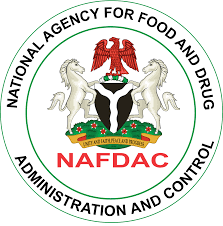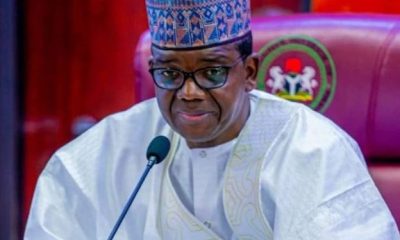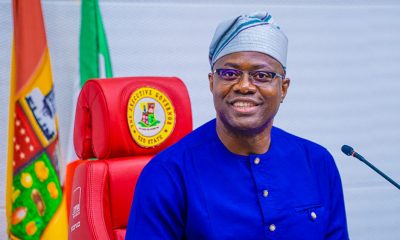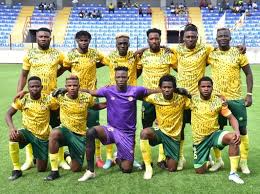FEATURES
AS TORRENTS OF TROPHIES POUR FOR ISA KUTEPA
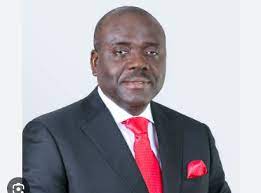
By Tunde Olusunle
Not too many people who had the kind of experience which Abdulrasaq Isa Kutepa had in 2011, were able to reinvent themselves and spring back on their feet, thereafter. A successful banker, high-flying oil magnate, serial entrepreneur and noteworthy philanthropist, Kutepa thought to avail his home state of Kogi some of the experiences he had garnered on his pluri-faceted routes in life.
Soundbites by those who speak about Kogi State profile the geo-polity as a pristine goldmine awaiting exploration. The monstrous Dangote Obajana Cement Project in Lokoja local government area, (LGA), on the Lokoja-Kabba road has been in operation for over a decade for instance. It is, however, just a tip of the iceberg of the infinite potentials and possibilities in the state. An additional cement enterprise has berthed in Iluhagba in Ijumu LGA of Kogi State, floated by Mangal Industries. Crude oil has been struck at the *Oda River- 1 well* in Ibaji LGA of the state, which, since 2022, qualified Kogi State for listing as an oil producing state. It is the first such state in the northern section of Nigeria.Beyond its endowments in solid minerals and petroleum, Kogi State is blessed with swathes and stretches of fertile lands across the state capable of sustaining a plethora of crop species. The state is home to scenic touristic sites and iconic monuments. Lokoja the capital of Kogi State for instance, is the confluence of Nigeria’s two largest rivers, the Niger and the Benue. The conjoining of both rivers is a sight to behold from atop *Mount Patti* in the Kogi State capital. Colonial era Governor-General of Nigeria, Frederick Lugard, superintended over Nigeria from the flatlands and highlands of Lokoja.
This was before the amalgamation of the northern and southern components of contemporary Nigeria into what many have described as a forced matrimony, in 1914. Lugard’s erstwhile workspace, today hosts the seat of administration in Lokoja. Added to all of these is the super-abundance of highly, multi-dimensionally educated, skilled and certified human capital from Kogi State. They are in such an overflow of numbers that most have opted for addresses elsewhere, within and outside Nigeria. I have always bragged for example, that with almost a dozen most deserving Senior Advocates of Nigeria, (SAN) from the Okun sphere in Kogi State, some whole states elsewhere and geopolitical zones may not be as endowed.
Kutepa had with him a diligently articulated masterplan to assist Kogi State in leveraging this bouquet of endowments, capabilities and competencies for its upward socioeconomic ascent. The document was safely in his pouch before he stepped into the political fray in the run-up to the primary of the off-cycle gubernatorial election of 2011. He pitched his tent in his bid for the governorship ticket with the Peoples’ Democratic Party, (PDP), the party to beat those days. The primary election which was to produce a successor to the incumbent governor, Ibrahim Idris at the time, attracted some of Kogi’s best and brightest, including Kutepa.
Apart from his credentials as a bona-fide homeboy, Kutepa had in previous times, selflessly dispensed to his constituents in parts of the state, flickers of his own “corporate social responsibility,” in his private capacity. While some politicians flaunted platoons of urchins they had recruited as deviants and thugs, Kutepa had already made a huge statement about the projected educational slant of his agenda, if he scaled the primary. He had built, equipped and donated classroom blocks, laboratories and similar facilities in parts of the state to schools, freewill, to underscore his specific preference for education as key to the future.
The Kogi State PDP governorship primary was held twice that year. It was fiscally, physically, even emotionally draining for the contestants and their supporters alike. Whereas some of the aspirants who participated in the earlier primary held in January 2011 withdrew from the September 2011 sequel, Kutepa ably participated in both. He diligently acquitted himself as the proverbial macho man in Yoruba lore who dared to sleep bare-chested in the open in the freezing temperatures of numbing harmattan. This underscored his deep-seated grit and ruggedness. He emerged in a photo-finish second position on both occasions, a most commendable showing for a self-propelled aspirant with neither a godfather or state backing in any form. He was pitched against the “anointed” candidate of the incumbent governor, Ibrahim Idris. Idris confessed to those who took him up on the subject that he was doomed to produce his kinsman as successor or risk being ostracised by his kinsmen, maybe neutralised. That is the variety of politics played in our clime.
Kutepa wasted no time brooding over the outcome of his attempt at the Kogi governorship. Not for him the lounging around the corridors of State House, Aso Villa, Abuja prospecting appeasement with a “candy bar,” in the name of some nebulous compensatory political appointment. He dusted his boots, made an about turn and headed for his primordial habitat in the skyscraping boardrooms of Victoria Island and Ikoyi, both highbrow districts in Lagos, at the very heart of the nation’s economy. Back in 1998, he had co-founded Waltersmith Petroman Oil Limited, an indigenous upstream oil and gas company, dedicated to the exploration and production of oil and gas resources. The company operates the *Ibigwe* field in “Oil Mining Lease 16,” Imo State, which was acquired through a competitive bid in 2004.
Waltersmith Petroman successfully began commercial exports from Ibigwe field in 2008, growing peak production to 7000 barrels per day, (bpd). The company’s 5000bpd modular refinery was commissioned by former President Muhammadu Buhari in 2020 and contributes almost 300 million litres of refined products annually. With the additional award of the *Assa* marginal field to Waltersmith in 2021, the modular refinery is being expanded to have a refining capacity of 40,000bpd. Waltersmith is also diversifying into power generation and has procured a 300 megawatts power generation license. In collaboration with the United Nations Industrial Development Organisation, (UNIDO), Kutepa’s organisation is developing an industrial and innovation park. Such has been the fairytale of the ascendancy of Kutepa’s vision, over one decade after the Kogi political experience.
The development of Kogi State also remains very dear to his heart as demonstrated by his unfailing generosity over time. Despite not clinching the governor ticket in 2011, Kutepa remained very supportive of the administration of Idris Wada, the veteran aviator who eventually got the ticket. For his carriage and comportment through the motions culminating in Wada’s emergence, Kutepa was assigned the prerogative of nominating a running mate to Wada. He never dithered before forwarding the details of Yomi Awoniyi, son of the historic personage, Sunday Bolorunduro Awoniyi, elder statesman and retired “super permanent secretary” of post-independence Nigeria. Kutepa has a relationship dating back to the late 1970s and early 1980s with the younger Awoniyi who read architecture, while he, Kutepa, studied sociology at the Ahmadu Bello University, (ABU), Zaria. Yomi Awoniyi indeed served as director-general of Kutepa’s campaign, ahead of the primary.
His *Isa Kutepa Foundation* has worked over the years with the United Nations Children and Educational Fund, (UNICEF) in the provision of potable water in rural communities across the state, taking up part responsibility of what is ordinarily the schedule of the government. He is also keen to endow a professorial chair in geology at the Federal University Lokoja, (FUL), devolving from his subsisting endeavours as a big player in the petroleum sector. Kutepa said this much when he received the management of the institution led by its Vice Chancellor, Professor Yemi Akinwumi, in his Lagos office, last year. Kutepa also committed to build structures at the permanent site of the medical school of the university, to accelerate the evolution of the new faculty.
Honours have kept pouring in recent months for the cultivated, urbane, personable Kutepa, ever generous with his smile and lather-laced laughter. He has for example been officially recognised for his enormous contributions to the socioeconomic life of the nation. Former President Buhari was sufficiently gracious to adorn him with the prized national honour of *Officer of the Order of the Federal Republic,* (OFR), before Buhari’s own disengagement last May. This was spontaneously followed by his investiture with the revered Nupe title of *Jikada Raya Kasar Nupe* by the *Etsu Nupe,* Dr Yahaya Abubakar, CFR, September 16, 2023, at a colourful ceremony in Bida, the heartland of the Nupe nation. Back home in Lokoja, his longstanding honour as *Majindadi* remains evergreen in communal consciousness. Kutepa equally has a long string of professional affiliations with home-based and foreign bodies.
The career transmutation of Abdulrasaq Isa Kutepa over the decades is the stuff of motivational modules. He will be 63 next February and earned an honours degree in sociology from ABU in 1982. He equally attended the Lee Kuan Yew School of Policy at the National University of Singapore. He was at the Citibank Global Training School, New York, in his tireless cycle of self-redevelopment. He cut his professional dentition at the former “Bank of Credit and Commerce International,” (BCCI), which later became “African International Bank,” (AIB), post-National Youth Service Corps, (NYSC), in 1984. He equally had stints at the erstwhile “Chartered Bank Nigeria Ltd,” now Stanbic/IBTC, and “Safetrust Savings and Loans Ltd.” He transited from the banking hall to the boardroom in 1998. Kutepa has served variously on the boards of publicly owned and private concerns over the years, and continues to make himself available for service in the public good.
A pan-Nigerian to the core, Kutepa grew up in the sociocultural melting pot of Lokoja where diverse tongues and different traditions converge. He is married to Kate Isa from Nigeria’s South East who shares her husband’s entrepreneurial DNA. Mrs Isa’s specialty is in scientific products and equipment, and the union is blessed with two charming children: Amina Ezinneka and Zaq Chidiebere. In a society still dominated in parts by mundane and parochial considerations like ethnicity and religion even in the 21st century, not many people from Kutepa’s parts will accede to their children bearing names considered “alien” to their geo-religious cleavages. Not for Kutepa, a conscientious patriot who thinks humanity and Nigeria first and foremost, before other thoughts.
*Tunde Olusunle, PhD, poet, journalist, scholar and author is a Fellow of the Association of Nigerian Authors, (FANA)*
FEATURES
The GMO Debate in Nigeria: Concerns over Safety, Regulations

A nationwide rally against Genetically Modified Organisms (GMOs) in Nigeria has brought to the fore the concerns of experts over the potential health and environmental risks associated with the introduction of the organisms into the country’s food system.
The rally, led by the Health of Mother Earth Foundation (HOMEF) in collaboration with the GMO-Free Nigeria Alliance and civil society organisations took place on December 13 in major cities across the country.
According to the conveners of the rally, the outing is aimed to raise awareness about the dangers of GMOs and to pressure the government to reconsider its decision to approve genetically modified foods in the country.
The World Health Organisation (WHO) describes GMOs as organisms whose genetic material has been altered using genetic engineering techniques.
The alteration, according to the international health agency, involves the use of biotechnology to introduce genes from one species into the DNA of another species, creating a new organism with desired traits.
Therefore, genetically modified foods are foods that have been altered using genetic engineering techniques.
At the heart of the controversy is the claim by proponents of GMOs that they can help address food insecurity in Nigeria.
They assert that crops can be engineered to be more resistant to pests and diseases, reducing losses and increasing yields.
One of the proponents of GMOs is Kabiru Ibrahim, the National President of the All Farmers Association of Nigeria.
Therefore, the advantage is that it would even take farmers out of poverty.
“Any country in the world that you see has food security, as a matter of fact, they also do GMO. Nigeria will attain food security if it embraces GM crops.
“The way out of poverty and to get into food security for Nigeria is through GM crops.
“This is why Brazil is now a developed country. Most of what comes out of Brazil, in terms of corn, beans, and all that, are all GM’’, Ibrahim said.
However, Dr Nnimmo Bassey, Executive Director of HOMEF, argues that Nigeria does not need GMOs to address food insecurity.
The design of the GM crops, he maintains, does not support local economic growth but promotes dependency on corporate seed supply.
Bassey cites the example of the National Cotton Association of Nigeria (NACOTAN), which reported no significant increase in yields after introducing GM cotton seeds four years ago.
Instead, he says, the yield per hectare remained the same, and farmers noted that no other plant could germinate on the farmlands where the GM seeds were planted, even after four years.
This, Bassey argues, confirms concerns about loss of biodiversity and soil degradation due to the release of genetic material into the soil.
On his part, Ifeanyi Nwankwere, National Co-coordinator of the GMO-Free Nigeria Alliance, says “GMOs approved in Nigeria are not currently being labelled.
“The country’s socio-economic context does not allow for effective labelling, considering how food is sold in cups and basins in open market where majority of the people shop from,” he said.
Nwankwere said the biosafety regulatory system in Nigeria was not designed to ensure safety with regard to GMOs.
For instance, he alleged, the National Biosafety Management Agency (NBMA) Act had fundamental flaws, including the lack of provision on the precautionary principle, inadequate provision on public participation in decision making and others.
Similarly, Mariann Bassey-Orovwuje, Deputy Director at Environmental Rights Action, cautions that several other countries, including Russia, Mexico, Uganda, and up to 23 more, have placed bans on GMOs, citing the recent ban of GMO corn in Mexico.
“The courts highlighted the threats of the GMO variety to the country’s rich diversity of corn, stating that the genetically engineered corn posed the risk of imminent harm to the environment,” she said.
Experts also argue that the introduction of GMOs in Nigeria poses serious health risks.
According to a recent report by an Iranian researcher, GMO soybean caused significant damage to internal organs such as the liver and kidney in rats.
More so, as noted Joyce by Brown, Director of Programmes at HOMEF, there is no evidence that the National Biosafety Management Agency (NBMA) has conducted medium or long-term feeding tests to ascertain the safety of GMOs approved for use in Nigeria.
She bemoaned the presence of more than 50 imported packaged food products, containing GM ingredients in Nigeria.
These products, according to her, are abundant in market shelves across the country in different brands including cereals, vegetable oils, spices, ice-creams, and cake mixes amongst others
In Benin, where Agho Omobude, Coordinator of the Edo Civil Society Organisations (EDOCSO) led others on a march to Edo House of Assembly, state office of the Federal Ministry of Agriculture and Food Security and the Government House.
At those placed petitions were submitted, particularly in respect of the recent approval of 14 genetically modified foods in the country.
Omobude advocated legislations that would outlaw the sale of genetically modified foods in the state aa well as the country. He raises concerns over some super markets in the state which are reportedly selling the products without providing the customers with information about them.
All in all, the campaign against GMOs in Nigeria is not just about health and environmental risks; it is also about the economic implications of introducing GMOs into the country’s food system.
As argued by Bassey, the promotion of GMOs is driven by the interests of multinational corporations, which are more concerned with profits than with the welfare of Nigerians.
The demands of the campaign are clear, a ban on GMOs, including products brought in for food and food processing, as well as packaged processed foods.
The coalition also demands the nullification of all permits granted for GMOs, as they are not backed by adequate and certified risk assessments.
Furthermore, the experts call for an investment in agroecology, which ensures food security and food sovereignty while strengthening the Nigerian economy.
Inarguably, the foundation of a nation’s sovereignty lies in its ability to produce and control its own food. Without this, sovereignty is merely a theoretical concept.
Anti-GMOs insist that its introduction into the country’s food system poses significant risks to human health, the environment, and the economy.
It is imperative that the government takes a cautious approach and considers the concerns of experts and civil society organisations before making any decisions about GMOs. (NANFeatures)
FEATURES
Breaking the Stigma of Male Victims of GBV
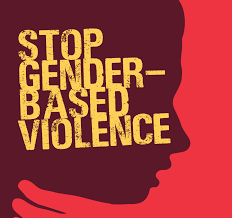
For decades, the narrative around Gender-Based Violence (GBV) has been dominated by the plight of women, with men often portrayed as the perpetrators.
However, the story of John Adegoke, a 35-year-old father of two, tells a different side of this issue.
On one fateful night, Adegoke’s wife became enraged, and the situation regrettably turned violent, leaving him with a broken arm and a shattered sense of self-worth.
“I felt so ashamed and embarrassed.
I didn’t know where to turn or who to talk to. I felt like I was all alone,” he recalls.Adegoke is not the only man with such an experience.
Similarly, Michael Osunbor, a 28-year-old entrepreneur, found himself a victim of abuse.
Osunbor’s partner was emotionally and verbally abusive, constantly belittling him, calling him names, and threatening to leave.
“I felt like I was walking on eggshells around her. I never knew what would trigger her anger. I felt like I was losing myself in the relationship,” Osunbor recounts.
Both Adegoke’s and Osunbor’s stories are not isolated incidents.
In fact, according to the World Health Organisation (WHO), one in six men will experience some form of GBV in their lifetime.
Furthermore, a study by the National Demographic and Health Survey (NDHS) in Nigeria revealed that 16 per cent of men reported experiencing physical violence, while 12 per cent reported emotional violence.
In spite these alarming statistics, male victims of GBV often face significant barriers when seeking help.
Societal norms surrounding masculinity make it difficult for men to admit they are victims.
Consequently, many feel ashamed or embarrassed and may fear being perceived as weak.
Mr Sulaiman Abaya, a renowned legal practitioner, says that men also suffer domestic violence, which can take psychological, economic, or physical forms.
However, he laments the lack of recognition and support for male victims of GBV.
“Even international conventions, protocols, and charters, which are domesticated locally, focus primarily on women as victims, with little emphasis on men. This is the root of the skewed narrative,” Abaya observes.
He further explains that men are socialised to appear strong and stoic, which often discourages them from seeking help.
This stigma, in turn, leads to a lack of support services tailored to male victims.
The consequences of this silence, according to human rights advocates, can be devastating.
Male victims of GBV are more likely to suffer mental health challenges such as depression and anxiety.
Moreover, they may turn to risky behaviours, such as substance abuse, as a coping mechanism.
Dr Rosemary Smith, a human rights activist, expresses these sentiments.
She notes that societal perceptions of masculinity often force male victims to suffer in silence.
“Men who experience GBV are often left without access to the support services they need.
“This can have serious consequences for their physical and mental health, and it perpetuates a cycle of violence and silence,” she says.
Smith emphasises the need to break down the stigma surrounding male victims and dismantle stereotypes about GBV.
To achieve this, she calls for inclusive support services that address the unique needs of both men and women.
“We need to create a safe and supportive environment where men feel comfortable coming forward and seeking help.
“This requires a fundamental shift in the way we think about GBV and recognition that men can be victims too,” she explains.
Abaya suggests that collecting data on GBV against men is critical.
In addition, he advocates for robust campaigns to raise awareness and encourage men to report cases of abuse.
“Human rights agencies should begin to recognise men’s rights. There could even be dedicated platforms, such as Facebook pages, for reporting GBV against men.
“Similarly, support systems should be put in place to help male victims,” he recommends.
In addition to providing support, Mr Samuel Chukwu, a Benin-based family adviser and counsellor, underscores the importance of addressing the root causes of GBV.
He highlights the need to challenge societal norms around masculinity and power.
“We need to challenge the societal norms that perpetuate GBV and promote a culture of equality and respect.
“This requires collective efforts from the government, civil society, and individuals,” Chukwu says.
He also identifies counselling, advocacy, and other tailored forms of support as essential measures to address the issue and help victims heal.
Similarly, Mrs Christy Ipinlaye of the Olive Foundation stresses the importance of awareness.
According to her, public campaigns, community outreach, and education are key to breaking the stigma and encouraging men to report cases of abuse.
As the world concludes the 2024 16 Days of Activism Against GBV, it is vital to remember the often-overlooked victims of this societal menace.
By breaking down the stigma and providing tailored support services, society can move closer to a world where everyone lives free from violence and fear. (NANFeatures)
FEATURES
Port Harcourt Refinery: Revival Signals New Era for Nigeria

Years after it went comatose, the Port-Harcourt Refinery rose up from ‘death’, courtesy of the seriousness attached to the all-important plant by its owners, the Nigerian National Petroleum Corporation Ltd. (NNPCL).
Little did stakeholders anticipate such a milestone could be swiftly achieved, boosting Nigeria’s domestic refining capacity.
After years of delays, maintenance challenges and rising dependency on imported refined petroleum products, the inauguration of the plant promises to be a potential shift in the country’s fuel supply dynamics.
While the government and industry stakeholders have lauded the achievement, the re-establishment of the operation did not go without hydra-headed challenges.
The Port-Harcourt refinery comprises two units, with the old facility capacity of 60,000 barrels per day (bpd) and the new plant, 150,000 bpd, both summing up to 210,000 bpd.
The refinery was shut down in March 2019 for the first phase of repair works after the government secured the services of Italy’s Maire Tecnimont, to handle the review of the facility with the oil major Eni as technical adviser.
In 2021, NNPCL announced the commencement of works at the PHRC after the Federal Executive Council (FEC) approved $1.5 billion for the project.
In December 2023, the government announced the completion of the mechanical and the flare start-off, one of Nigeria’s oldest and most critical facilities, inaugurated to reduce dependency on foreign refineries.
With the capacity to process over 210,000 barrels of crude oil per day, the refinery is expected to significantly boost local production of petroleum products, including petrol, diesel and kerosene.
In a landmark move, NNPC Ltd. officially began production at the facility, signaling a return to active refining operations after years of dormancy and extensive rehabilitation work.
The christening on Nov. 26, was attended by major stakeholders: government officials and industry experts, all of who expressed optimism about the refinery’s potential to enhance domestic fuel supply and job creation.
While the inauguration is a monumental achievement, the journey to full operational capacity has not been without its noticeable hiccups.
Reports indicate that there are still several operational and logistical challenges facing the refinery, including issues with the supply of crude, infrastructure inadequacies and technical glitches.
Also, there are concerns about the refinery’s ability to operate at full capacity consistently, as its systems have suffered from years of underinvestment.
The prolonged downtime and intermittent operations have raised doubts about whether the refinery can contribute meaningfully to meeting Nigeria’s domestic fuel needs without delay.
Though the refinery’s management has acknowledged some of the identified setbacks, yet, it remains committed to resolving the issues in the short-term to avoid further disruptions.
In spite of the challenges, stakeholders within Nigeria’s oil and gas sector including Dr Ayodele Oni, a Partner at Bloomfield Law Practice, notes the reopening is a positive step towards addressing the nation’s fuel supply crisis.
Oni says the Port-Harcourt’s production is expected to significantly reduce the nation’s dependence on imported fuel, which has long been a source of concern due to the foreign exchange burden and the fluctuations in international oil prices.
According to him, for Nigeria’s local refineries, the Port-Harcourt refinery holds the promise of reducing astronomical price of fuel imports, by ultimately saving the country’s billions of dollars annually.
It is also anticipated to create thousands of jobs, both directly and indirectly through the supply chain, from transportation to distribution.
Mr Mike Osatuyi, a former National Operations Controller of the Independent Petroleum marketers Association of Nigeria (lPMAN), says by the inauguration, the refinery is expected to contribute to Nigeria’s energy security by bolstering its refining capacity.
Osatuyi says this shift can pave the way for more refineries to return to full capacity and help Nigeria meet its increasing energy demand.
According to him, the refinery’s operational success could drive the government’s push for improved infrastructure in the downstream oil and gas sector, thereby creating a more self-sufficient and sustainable energy ecosystem.
“Local businesses and citizens stand to benefit from a more stable and reliable supply of fuel, which is crucial for everyday activities and economic growth.
Also, industry observers, according to him, will be quick to predict that an efficient, fully operational Port-Harcourt refinery can lead to reduction in the country’s fuel scarcity which has led to long- queues at filling stations and rising fuel prices.
An energy expert, Mr Salisu Danjuma, explains the corporation’s assignment should not end with the Port Harcourt Refinery alone.
Danjuma notes the corporation has laid out plans to increase its capacity with the completion of the Warri and Kaduna refineries, as well as enhancing the operations of the Port Harcourt plant.
He believes the goal is to make Nigeria a net exporter of refined petroleum products, reducing the country’s dependency on imported fuels while creating a robust energy sector that can support both domestic and international demand.
According to him, while the current phase of the Port Harcourt refinery’s operations is a positive indicator of progress, NNPC Ltd. still faces the task of addressing its operational challenges and ensuring long-term sustainability.
“The government has committed to investing in more capacity expansion and technology upgrades to modernise the country’s refineries.
“The commissioning of the Port Harcourt Refinery is undoubtedly a significant step for Nigeria’s oil and gas sector, with the potential to reduce the country’s fuel import bill and improve domestic fuel supply.
“While the refinery’s operations face some initial setbacks, the initiative is hailed by stakeholders as a critical move toward enhancing the nation’s energy security, boosting economic growth, and creating employment opportunities.
“Moving forward, the full success of the Port Harcourt Refinery will depend on the NNPC Ltd.’s ability to tackle its current operational challenges, ramp up production and create a stable and efficient refining ecosystem.
“If these obstacles are overcome, Nigeria could see a transformative shift in its energy landscape, reducing its reliance on imports and promoting self-sufficiency,” he added.
Reacting, the Nigeria Union of Petroleum and Natural Gas Workers (NUPENG), acknowledged the support of President Bola Tinubu, as well as the collaborative efforts of the NNPCL Board and contractors for the successful hauling of the facility.
Its President, Mr William Akporehe, and General Secretary, Mr Afolabi Olawale, described the commencement of the crude oil processing and the dispatch of petroleum products from the refinery as a landmark achievement that resonates with the aspirations of Nigerian citizens.
The union declared that the achievement demonstrated by NNPCL’s commitment to the country’s sustainable economic growth cannot be over-emphasised.
It commended the Group Managing Director of the corporation, Mele Kyari, for steering PHRC’s rehabilitation to completion, despite numerous challenges.
Nigeria owns four refineries: two in Port Harcourt and one each in Warri and Kaduna; but they have been moribund for years despite the Turn-Around-Maintenance (TAM) efforts.
The moribund state of the local refineries pushed Nigeria to depend solely on the importation of petroleum products for domestic use for several years, constituting a major drain on the nation’s foreign reserves.
For decades, successive administrations moves at reviving the nation’s refineries to reduce dependency on petrol importation failed.
In 2015, former President Muhammadu Buhari pledged to optimise those performing below capacity and boost foreign reserves by halting importation of refined fuel.
In November 2018, that administration scheduled December 2019 as the terminal date for three of the refineries to attain full production capacity to end petroleum importation and later shifted same to 2020.
Though, while the 2020 deadline was not realised, the government had spent N10.23 billion as at June 2020 on three of the refineries which processed zero crude.
By May 2023, the Federal House of Representatives Ad-hoc Committee on the state of refineries in the country made a disclosure that the federal government had spent over N11 trillion on the rehabilitation of the refineries between 2010 to 2023.
Just August 2023, President Bola Tinubu assurance that the PHRC would become functional by December after numerous failed attempts is now a reality.(NAN)





